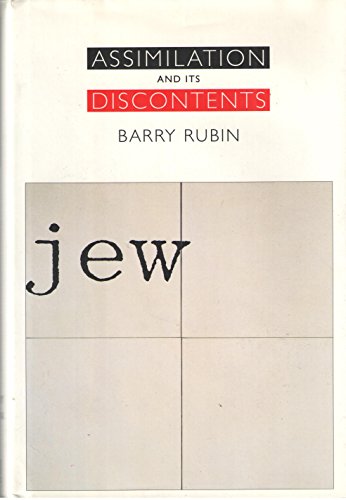Assimilation and Its Discontents
Barry Rubin
BOOK REVIEW

In the relentless quest for identity and belonging, Barry Rubin's Assimilation and Its Discontents invites readers into a labyrinth of cultural conflict and ideological turmoil. This is not merely a book; it is a potent inquiry into the chasms that exist between a community and its diaspora, fundamentally questioning the values that bind and break them apart.
Have you ever felt caught between two worlds, struggling to carve out a space that feels like home? Rubin lays bare the journey of individuals who grapple with their cultural roots while navigating the demands of a society eager to label them as 'other.' The emotional weight of this dilemma runs deep as he articulates the stark reality faced by those who seek assimilation without recognizing the cost: the loss of self. Through his compelling narrative, Rubin ignites a fire in your soul, compelling you to confront not just the experiences of the protagonists, but your reckoning with identity, community, and belonging.
Drawing from historical analysis and poignant anecdotes, Rubin details how different groups, particularly within the Jewish community, have confronted the pressures of assimilation. It's a harsh light he sheds, revealing not only the triumphs but the profound disillusionment that often accompanies such a struggle. This discontent is not solely personal; it resonates on a broader societal level, challenging the very fabric of what it means to be American in a melting pot that sometimes boils over.
Readers have debated the implications of Rubin's insights fiercely. Some argue that his perspective is essential for understanding the modern identity crisis, while critics claim he romanticizes the discontent at the expense of offering solutions. Yet, as you plunge deeper, you can't help but feel that Rubin's narrative holds a mirror to society-forcing us to confront uncomfortable truths about integration, acceptance, and the pain of bifurcation.
This book brings forth critical contemplation regarding the American Dream. Is it truly attainable, or merely a mirage for those caught in the push and pull of assimilation? Rubin echoes the sentiments of many who have walked this path, reminding us that the quest for acceptance can lead to a painful disconnection from heritage. The visceral feelings of betrayal and loss churn within these pages, echoing historical experiences that ripple through generations. You cannot help but feel that what is at stake extends beyond individual lives; it's about the legacy we choose to honor or erase.
Rubin also emphasizes the irony embedded within the assimilation narrative-those who aim to fit in often find themselves marginalized, their voices muffled in the cacophony of mainstream culture. This resonates profoundly in today's world, where belonging continues to be a contentious subject. Readers have lauded his ability to connect past with present, and many find themselves reflecting on their own life experiences, recognizing the threads of discontent woven through their narratives.
Yet, the book does not solely dwell in the shadows of despair. There is an undercurrent of hope as Rubin explores instances of successful assimilation where cultural identities harmonize rather than clash. This nuanced view pulls the reader into a space where resilience is celebrated-reminding us that the struggle for identity can birth beautiful symbiosis if nurtured correctly.
As you close the final chapter of Assimilation and Its Discontents, there lies an invitation-an urgent call to acknowledge the complexities of cultural identity. It's a transcendental moment, filled with revelations that leave you questioning not only your views on assimilation but on the very essence of belonging. This book resonates long after the last page has turned, igniting a firestorm of introspection that demands to be shared with others.
In a world increasingly defined by divisions, Rubin's work serves as a powerful catalyst for dialogue, urging us to grapple with the intricate dance of acceptance and alienation. The discourse he opens is one that we all need to engage in: to explore how we can forge connections without losing the essence of who we are. It's essential reading for anyone grappling with the identity puzzle or simply wishing to understand the larger tapestry of societal dynamics. 🎭✨️
📖 Assimilation and Its Discontents
✍ by Barry Rubin
🧾 333 pages
1995
#assimilation #discontents #barry #rubin #BarryRubin